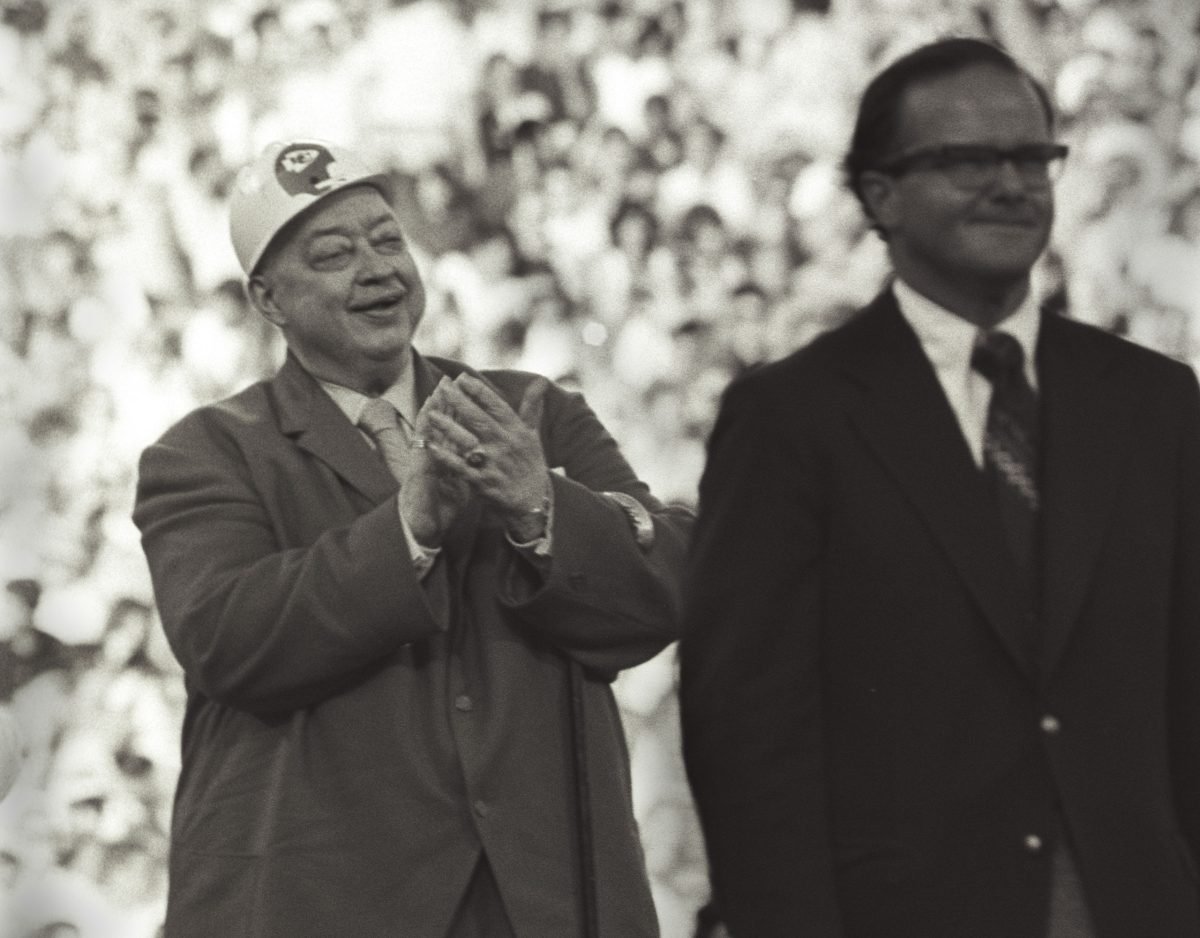The Story of “The Chief”: H. Roe Bartle
Courtesy: Missouri Valley Special Collections, Kansas City Public Library, Kansas City, MO
On May 8, 1974, Kansas City mourned the loss of one of its most influential figures, H. Roe Bartle, affectionately known as "The Chief." As a former two-term mayor and a dedicated Boy Scouts of America executive, Bartle left a lasting mark on the city's history. His legacy extends far beyond his time in office, as he played a pivotal role in shaping the city's growth and development.
Harold Roe Bennett Sturdevant Bartle was born on June 25, 1901, in Richmond, Virginia, or Solon, Iowa, depending on the source. His early years were marked by a love for music and a desire to serve his country. At the age of thirteen, he played the piano and organ at his father's church and even attempted to enlist in the army. However, his father intervened, providing proof of his age and securing his discharge.
H. Roe Bartle seen shouldering a sledgehammer while chewing on a cigar in Casper, Wyoming. Bartle worked in Casper as a Boy Scout official. Courtesy: Missouri Valley Special Collections, Kansas City Public Library, Kansas City, MO
Bartle's education journey was characterized by a strong determination to succeed. He attended Fork Union Military Academy between 1916 and 1920, where he became a championship debater. Subsequently, he enrolled at the University of Chattanooga, displaying natural athletic talent, but a bout of pneumonia interrupted his studies. He eventually earned a law degree from Hamilton College of Law in 1921.
In 1923, Bartle met Margaret Ann Caroline Jarvis, and they married shortly after. The couple had one child, Margaret Roe "Jimmy" Bartle Taylor. Bartle's life took a turn towards public service and leadership, and he would become a towering figure in the community.
Courtesy: Missouri Valley Special Collections, Kansas City Public Library, Kansas City, MO
Bartle's involvement with the Boy Scouts of America marked the beginning of his illustrious career in youth leadership. He served as a scout executive in various locations, overseeing significant growth in the organization. In 1925, he founded the Tribe of Mic-O-Say, an honor camper program, which attracted thousands of young boys to scouting. Bartle's nickname, "The Chief," was derived from this period, as he claimed to be inducted into a local Arapaho tribe and used the name "Chief Lone Bear" as part of the Mic-O-Say program.
While excelling in his Scouting career, Bartle also ventured into profitable business enterprises and made wise investments. His remarkable skills as a public speaker led him to address diverse audiences, earning substantial fees for his speeches. The money he made in the private sector enabled him to fund organizations he was passionate about, including the Boy Scouts.
Bartle's philanthropic endeavors were vast and impressive. He served on numerous boards and commissions, including during World War II as the director of American War Dads, a soldier-welfare group. He also founded the American Humanics Foundation, now known as the Nonprofit Leadership Alliance, which prepares students for leadership in nonprofit organizations. Bartle's commitment to service extended to his role as National President of Alpha Phi Omega service fraternity and his membership in various charitable and religious organizations.
Bartle & Lamar Hunt. The Chiefs are named after Bartle’s nickname, “The Chief”.
In 1955, at the urging of President Harry Truman, Bartle entered the political arena and was elected as mayor of Kansas City. During his two terms, he oversaw significant developments, including the desegregation of city hospitals, tax code reforms, and the attraction of professional football and baseball teams to Kansas City. The Dallas Texans football team was renamed the Kansas City Chiefs in honor of Bartle's nickname.
Bartle's larger-than-life personality, towering physical presence, and powerful oratory skills made him a beloved figure in Kansas City. He was known to give up to 700 public speeches each year, earning him recognition as one of the region's most dynamic speakers.
After completing his two terms as mayor in 1963, Bartle continued his volunteer work and speech-giving for another decade. He passed away on May 8, 1974, leaving a lasting legacy in Kansas City. Today, his memory lives on in Bartle Hall, the convention center named in his honor, and at the H. Roe Bartle Scout Reservation in Osceola, Missouri. He is buried at Forest Hill Cemetery near Gregory & Troost.
H. Roe Bartle's life is a testament to the power of service, dedication, and leadership in shaping a community's history and future. His impact on Kansas City endures, and his legacy as "The Chief" continues to inspire generations to come.
PS: If you enjoyed reading this biography of H. Roe Bartle, you'll love Streets & Stories! Join other KC Yesterday fans learning about Gregory, Wornall, Ward, Troost, and more KC pioneers!




